What Is Commercial Plumbing? A Complete Guide for Businesses
If you’ve ever asked yourself what is commercial plumbing and how it impacts your business operations, you’re not alone. Commercial plumbing plays a crucial role in ensuring that water supply, drainage, and heating systems function efficiently across large facilities. Whether it’s an office building, shopping center, restaurant, or hospital, reliable plumbing keeps your business running smoothly while maintaining health and safety standards.
Commercial plumbing systems are designed to handle higher usage demands compared to residential ones. Because businesses rely on plumbing for both customer service and daily operations, even minor plumbing issues like leaks or clogs can lead to significant downtime and costly repairs.
What Is Commercial Plumbing?
At its core, commercial plumbing involves the installation, maintenance, and repair of plumbing systems in non-residential settings. These systems are engineered to support multiple floors, heavy water usage, and complex piping networks.
Commercial plumbers are trained to manage a variety of systems, including water supply lines, drainage systems, gas plumbing, and commercial-grade fixtures. They must also comply with strict local building codes and safety standards to ensure every system operates efficiently and safely.
For example, the plumbing system in a hotel or restaurant must be able to support hundreds of daily users while ensuring sanitation and water quality remain consistent. That’s why commercial plumbing requires advanced skills, specialized tools, and detailed planning.
Essential Components of a Commercial Plumbing System
A fully functioning commercial plumbing system consists of several interconnected parts that work together to deliver clean water and remove waste effectively:
- Water Supply Lines – These deliver potable water throughout the building, often at high pressure.
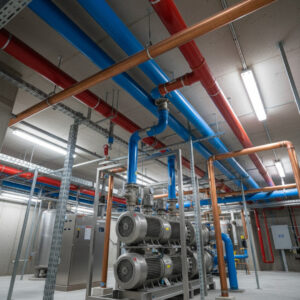
- Drainage and Waste Systems – Designed to transport wastewater safely out of the facility and prevent contamination.
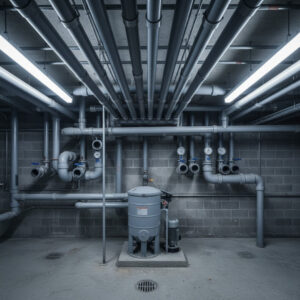
- Gas Plumbing Lines – Used for heating systems, kitchens, and certain industrial processes.
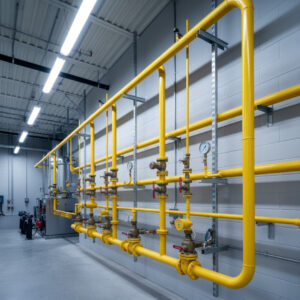
- Fixtures and Appliances – Include toilets, sinks, water fountains, dishwashers, and boilers built for heavy-duty use.
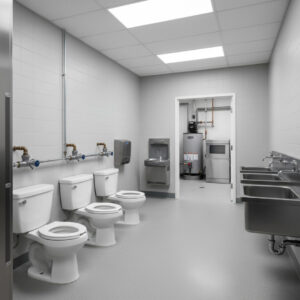
- Backflow Prevention Devices – Critical for preventing contaminated water from reversing into the clean supply line.
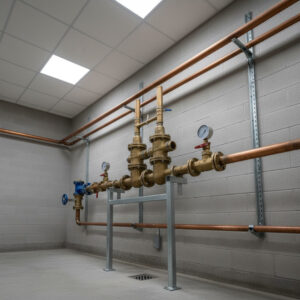
Each part must be properly installed, regularly inspected, and maintained to ensure optimal performance.
Common Commercial Plumbing Services
Commercial plumbers offer a wide range of services that go beyond simple repairs. Common commercial plumbing services include:
- System Design and Installation: Setting up large-scale plumbing networks for new buildings or renovations.
- Preventive Maintenance: Scheduled inspections to catch issues before they disrupt business operations.
- Drain Cleaning and Hydro Jetting: Removing debris and buildup using high-pressure water jets.
- Leak Detection and Pipe Repair: Identifying hidden leaks to prevent water loss and structural damage.
- Water Heater and Boiler Maintenance: Ensuring consistent hot water supply for large commercial applications.
- Emergency Plumbing Services: Providing 24/7 support to address sudden plumbing breakdowns.
Regular maintenance helps avoid unexpected system failures and ensures your plumbing meets code requirements year-round.
How Commercial Plumbing Differs from Residential Plumbing
The main differences between commercial and residential plumbing systems are scale, complexity, and demand. Residential systems typically serve one family, while commercial systems must accommodate dozens or even hundreds of people daily.
Additionally, commercial plumbing often spans multiple floors, requires larger pipes, and must handle more water pressure and waste volume. Because of these challenges, commercial plumbers use advanced diagnostic tools, industrial-grade materials, and specialized techniques to keep systems running efficiently.
Choosing the Right Commercial Plumbing Company
Selecting a qualified commercial plumbing contractor is vital to maintaining system reliability and safety. Always choose licensed, insured professionals with proven experience handling complex plumbing networks. Look for a company that provides transparent pricing, 24-hour emergency service, and customized maintenance plans for your facility.
A trustworthy commercial plumber won’t just fix issues, they’ll help you prevent them through regular inspections and proactive system care.
Conclusion
Understanding what is commercial plumbing helps business owners appreciate just how vital a well-maintained plumbing system is to daily operations. From ensuring consistent water flow and drainage to maintaining hygiene and safety compliance, every component plays a crucial role in your business’s success.
For expert service, repairs, and long-term maintenance, trust Benner Plumbing & Heating Ltd. With decades of experience serving commercial clients, Benner Plumbing & Heating Ltd. delivers reliable, high-quality plumbing solutions designed to keep your business running efficiently no matter how big or complex your system may be.